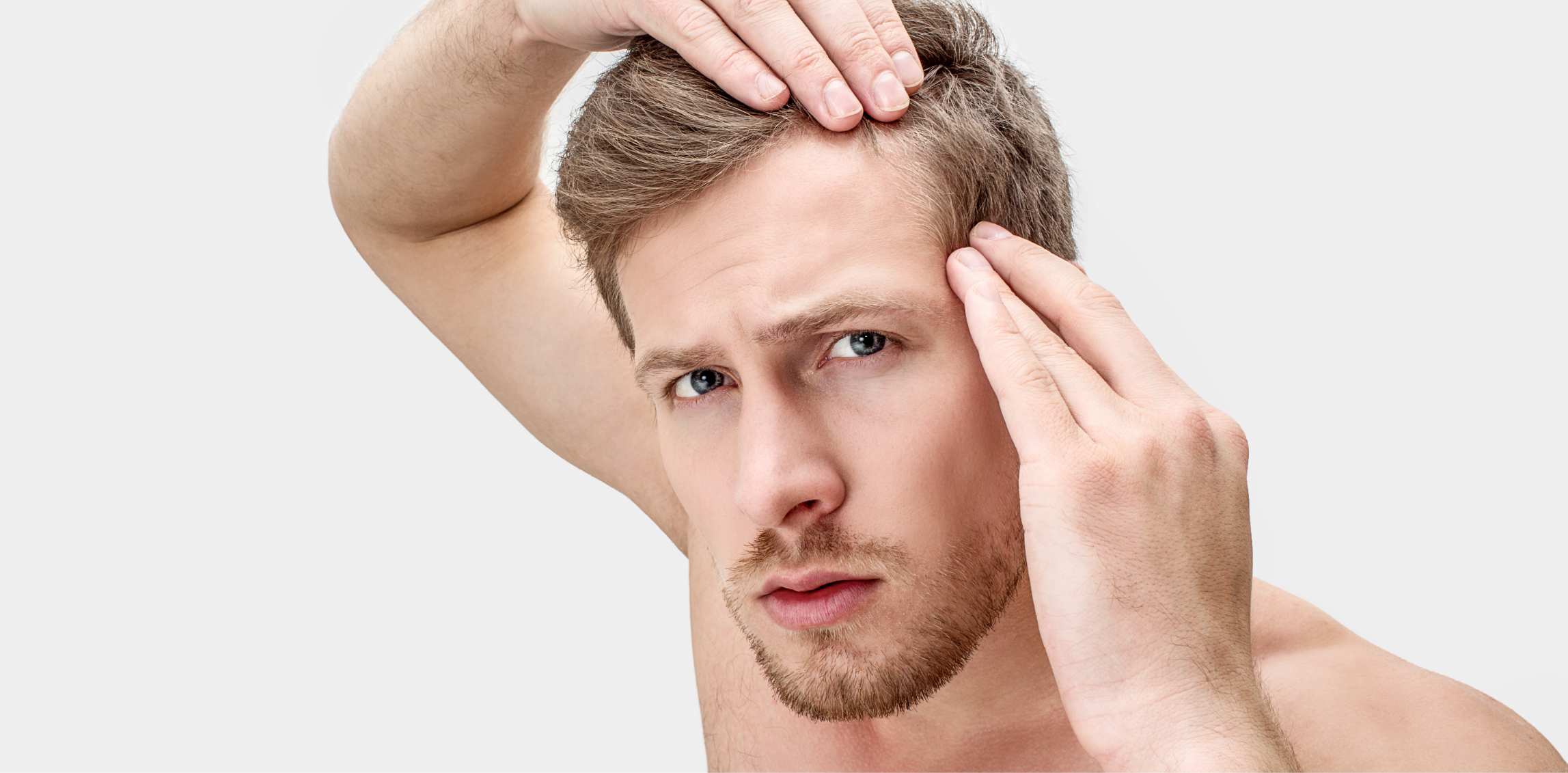Hair loss can be a frustrating and complicated issue to deal with. There are a variety of different types of hair loss. Causes of hair loss can range from stress and genetics to underlying issues within the body. Treatments for hair loss are specific to the type of hair loss you are experiencing and can range from a simple supplement regimen to oral medications. Blood work is sometimes performed in an attempt to target the underlying cause of hair loss too. If you struggle with this issue, our team of hair loss experts can identify its source and help you maintain the health of your hair.
Androgenetic Alopecia (Genetic Hair Loss)
Androgenetic alopecia is also known as male and female pattern baldness or hereditary hair loss. Everyone loses hair. It is normal to lose about 50-100 hairs every day. However, if you see bald patches or lots of thinning, you may be experiencing alopecia. The most common type of alopecia is a medical condition called hereditary hair loss. About 80 million men and women in the United States have this type of hair loss.
There are many reasons why people experience hair loss. However, if hair loss is gradual and becomes more noticeable with each passing year, it is likely hereditary hair loss.
Hair Loss Treatments for Androgenetic Alopecia
While medications like minoxidil are frequently used to prevent hair thinning, they aren’t always effective. Propecia is an effective alternative that can address signs of male pattern hair loss. This prescription medication can be incorporated into your daily routine to help maintain the strength of your hair and stop bald spots in their tracks. Contact our team here at McLean or Potomac to learn more about this treatment.
Propecia is FDA-approved as a hair loss treatment in men only. If you’re a man experiencing crown thinning or baldness, this treatment may be right for you. This medication can, and sometimes should, be used along with other hair loss treatments. These include shampoos, topical medications, and some oral medications. This drug should not be used by pregnant women.

Alopecia Areata
Alopecia areata is an autoimmune disease. Autoimmune means that the body’s immune system attacks the body. Alopecia occurs when the immune system attacks hair follicles (structures that contain the roots of the hair). A person’s genetic makeup, combined with other factors, triggers this form of hair loss. It can occur at any age; it often begins in childhood. Alopecia is not contagious. It is not due to nerves. This disease most often occurs in otherwise healthy people.
Hair Loss Treatments for Alopecia Areata
There is no cure for alopecia areata. Hair often re-grows on its own. Treatment, however, can help the hair re-grow more quickly. One or more treatments help the hair re-grow more quickly. Treatments include the use of corticosteroids, which suppress the immune system, Minoxidil, which allows hair to re-grow, Anthralin, which alters the skin’s immune function, and Diphencyprone (CPCP), which causes a small allergic reaction to trick the immune system.
Telogen Effluvium
Telogen effluvium is a form of nonscarring (temporary) hair loss characterized by diffused hair shedding. This type of hair loss often occurs noticed suddenly after an individual has experienced stress. Physical stress, or illness, can cause this type of hair loss, as can emotional stress.
Telogen Effluvium Treatment
No treatment is needed. Generally, recovery is spontaneous and occurs within six months. Remember that the hairs fall out when a new hair growing beneath it pushes it out. Thus with this type of hair loss, hair falling out is a sign of hair regrowth. As the new hair first comes up through the scalp and pushes out the dead hair, a fine fringe of new hair is often evident along the forehead hairline. To help hair regrowth, the following supplements are recommended:
- Daily prenatal vitamin (for women) with DHA and EPA daily.
- Viviscal Professional (2 capsules per day).
- Biotin once daily (5,000mg per day).
Lichen Planopilaris (LPP)
Lichen planopilaris, or scarring alopecia, is a rare inflammatory condition that results in progressive, permanent hair loss. This occurs most often on the scalp. LPP usually affects young adult women, although the age range is wide and can also affect men. Although LPP is rare, it is one of the most common causes of scarring hair loss on the scalp. The cause of LPP is unknown.
Lichen Planopilaris (LPP) Hair Loss Treatments
The goals of treatment are to improve patient symptoms and to slow the progression of the disease. There is no current treatment to recover hairs that have been lost and replaced by scarring, which is why early treatment is important. Hair loss may continue even with treatment but at a slower rate.
- Topical and intralesional steroids.
- Oral medications (glucocorticoids, hydroxychloroquine).
Traction Alopecia
Traction alopecia is hair loss due to tight pulling on the hair, such as from frequently wearing your hair in a tight ponytail or braid. It is very common in African American women and in those who wear hair weaves.
Hair Loss Treatments for Traction Alopecia
Unfortunately, once the hair is lost, there is no treatment to regrow it. To prevent further loss, you should not wear your hair in a tight hairstyle. Instead, you should wear your hair naturally or in loose braids or a loose ponytail. It is also important to change your hairstyle frequently so as not to cause hair loss in one particular area. Do not wear a hair weave to cover up the hair loss, as this can actually worsen the hair loss.
Scarring Alopecia
Scarring alopecia is hair loss due to the destruction of hair follicles caused by inflammation or trauma, such as a serious infection or a burn. This inflammatory condition causes scarring and permanent hair loss. Scarring alopecia affects both women and women but is rare in children.
Hair Loss Treatments for Scarring Alopecia
The treatment depends on the type of cells that are causing the inflammation in your body. Request a consultation with the hair loss experts at McLean & Potomac Dermatology to find the best treatment option for you.
Before and After Photos
Schedule Hair Loss Treatments in McLean, VA, or Potomac, MD
Regardless of the cause of your hair loss, our team of hair loss experts can help. We offer several treatment options to help you retain your mane for as long as possible. Give your scalp the best treatment today by connecting with one of our locations and scheduling your appointment.
Set up your consultation by giving us a call at (703) 356-5111.










